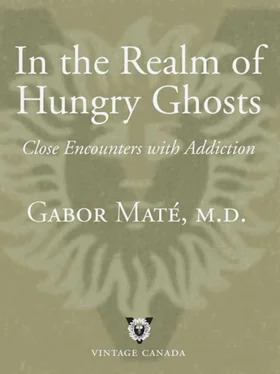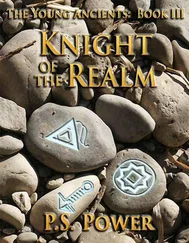Other ingenious schemes McDermitt has participated in involved stealing aluminum from construction sites and siphoning gasoline from big trucks. I ask him where he sells this stuff. He shrugs. “I used to deal with Larry, but they killed Larry. He got murdered…. He used to say, ‘Fuck, McDermitt, at least cut these in half.’ I get a bunch of fucking aluminum, I phone a wheelchair taxi, taxi pulls up…We put in three hundred pounds of aluminum. I usually make two hundred and ten dollars, minus thirty for the cab. That’s a hundred and eighty bucks.”
For many addicts crime becomes a necessary part of life—automatic, reflexive, to be taken for granted. One morning I marched up to a patient’s room to retrieve an expensive leather coat. He’d stolen it half an hour earlier during a medical visit at a colleague’s office. The doctor phoned me in an agitated state right after this man had left. “I just turned my back for a moment,” he said. The patient was apologetic but not overly remorseful. “I couldn’t help it,” he pleaded. “It was lying on his chair. What could I do?”
“What could I do?” was also the defence of another patient, Mike, who pocketed my PalmPilot one day when I left him sitting in my office for no more than twenty seconds. It was during my early days at the Portland; I’d stepped into the next room to pick up a prescription pad. I naïvely believed that this man, who once made me a finely worked wood carving to express his gratitude, could be trusted. Perhaps he could be trusted, but his addiction could not. Five minutes after he left I noticed the empty space on my desk where the PalmPilot had been. I shut the office, reassured the waiting patients that I’d be back shortly and hurried down the block to Mike’s hotel. It took a few sharp knocks before he opened the door.
“I want it back,” I said.
“What?” he replied.
“Look, Mike, you have two options: you return my PalmPilot immediately or immediately I call the police.” Mike slumped on his bed, a defeated look on his face.
“Okay, first thing tomorrow.”
“No, first thing right now.”
“I don’t have it,” Mike said.
“Then find it.”
We walked down the stairs of the Sunrise Hotel together and entered the pawnshop around the corner. “I need that PalmPilot back,” Mike announced to the owner. “It belongs to this guy.”
The pawnbroker feigned shock. “What you mean?” he cried. Quite obviously, or so his body language implied, this was the first time ever that here, on the East Hastings drug and crime strip, anyone had tried to pass stolen goods at his establishment. “Why you no tell me it wasn’t yours?” he said in a tone of reproach.
As the owner picked out my item from among a pile of electronic devices, Mike shuffled about, not seeming the least bit comfortable. “It was there on your desk,” he explained as we left the store. “What could I do?”
There are thousands of destitute hardcore drug addicts in Vancouver’s Downtown Eastside alone. Knowing that many of them have to steal, shoplift, scam and panhandle hundreds of dollars a day to sustain their habits, we can begin to compute the economic hit our society is taking in service of the arbitrary principle that people may poison themselves with alcohol or kill themselves with cigarette-derived toxins, but those whose drug of choice is a narcotic or a stimulant are to be considered criminals.

Undeterred by the miserable failure of its War on Drugs, the U.S. administration has taken upon itself to oppose decriminalization and harm reduction programs anywhere on the globe. In April 2006 the Mexican Senate approved a bill to decriminalize the possession of small amounts of marijuana, cocaine, heroin and other drugs for personal use. 12The office of President Vicente Fox signalled his willingness to pass the bill into law. “We can’t close our eyes to this reality,” said Senator Jorge Zermeno of Fox’s conservative National Action Party. “We cannot continue to fill our jails with people who have addictions.” It took less than twenty-four hours of U.S. “advice” for the Mexican government to change its mind. The measure was sent back for “further study,” which is to say, to its legislative grave.
Some political leaders in Ottawa welcome the hard-line mentality emanating from Washington. In December 2006, under the headline “Canada Looks to USA for Drug Policy Hints,” the Vancouver Sun reported that Conservative cabinet ministers and their aides are consulting “keen” U.S. federal officials on a new national drug strategy, according to documents obtained by the paper. Neil Boyd, a criminologist at Simon Fraser University, commented that “the Harper government favours a U.S.-style approach to drug problems, which is to lock more people up.” Rather than recognizing addiction as a health issue, said Dr. Boyd, this view sees it as “a criminal law problem of morality. That’s very much at odds with what’s going on in Europe and there’s really no good evidence to suggest that it’s going to be terribly useful.” 13The restrained and understated words of a carefully spoken academic.
In Washington State the King County Bar Association has acknowledged the devastation caused by prevailing drug policies. In 2001 it adopted a comprehensive statement asserting that the War on Drugs is “fundamentally flawed and is associated with numerous negative societal consequences.” Their summary of the War’s disastrous effects reflects the consensus view of virtually all those, in North America and elsewhere, who have studied the question without ideological blinkers:
• the failure to reduce problematic drug use, particularly among children;
• dramatic increases in crime related to prohibited drugs, including economic crimes related to addiction and the fostering of efficient and violent criminal enterprises that have occupied the unregulated and immensely profitable commercial market made possible by drug prohibition;
• skyrocketing public costs arising from both increased drug abuse and increased crime;
• erosion of public health from the spread of disease, from the concealment and inadequate treatment of addiction and from undue restrictions on proper medical treatment of pain;
• the abridgement of civil rights through summary forfeitures of property, invasions of privacy and violations of due process;
• disproportionately adverse effects of drug law enforcement on the poor and persons of color; and
• the clogging of the courts and compromises in the effective administration of justice, as well as a loss of respect for the law. 14
The War on Drugs fails, and is doomed to perpetual failure, because it is directed not against the root causes of drug addiction and of the international black market in drugs, but only against some drug producers, traffickers and users. More fundamentally, the War is doomed because neither the methods of war nor the war metaphor itself is appropriate to a complex social problem that calls for compassion, self-searching insight and factually researched scientific understanding.
The pertinent question is not why the War on Drugs is being lost, but why it continues to be waged in the face of all the evidence against it.
CHAPTER 26

Freedom of Choice and the Choice of Freedom
Acore assumption in the War on Drugs is that the addict is free to make the choice not to be addicted and that harsh social or legal measures will deter him from pursuing his habit. It is not that easy. Contrary to Nancy Reagan’s simplistic billboard messages, people cannot “just say no” in the face of addictive drives.
Читать дальше














